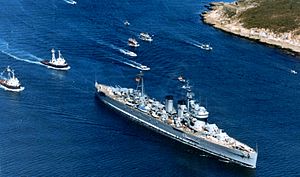User:Johann/sandbox9
| Gibraltar Blockade | |||||||
|---|---|---|---|---|---|---|---|
| Part of the Cold War | |||||||
 Spanish flagship España in Gibraltar waters, 1965 | |||||||
| |||||||
| Belligerents | |||||||
|
|
| ||||||
The Gibraltar Blockade was one of the first international crises of the Cold War, beginning in the early 1960s. Spain, led by the Spanish Landonist Workers' Party, revived its claims to British-ruled Gibraltar starting from 1959 on the initiative of Spanish premier and General Secretary Enrique Líster. He closed the land borders with Gibraltar on 1 May 1959 to all traffic and deployed the Spanish Navy off the coast to prevent maritime shipments. The Royal Navy's Mediterranean Fleet was dispatched to Gibraltar, creating a tense stand off and causing problems for international shipping in the Strait of Gibraltar. While the naval blockade was lifted in December 1959, the land border remained closed and Spanish naval patrols continuously harassed any ships attempting to enter the port of Gibraltar, effectively reducing the amount of supplies arriving in the territory to a trickle. The Royal Air Force (RAF) became the main lifeline of Gibraltar residents for years, flying from Morocco, and the residents overwhelmingly voted to remain part of the United Kingdom in the 1975 Gibraltar status referendum. The Spanish government reopened the border and ended the blockade entirely in January 1976, agreeing to not challenge British sovereignty over Gibraltar for at least forty years.
The Gibraltar Blockade highlighted the post-Great War II economic and political divisions in Europe, and helped consolidate the Western European powers, including the United Kingdom, France, and Germany, into a cohesive alliance directed against the expansion of Landonism on the continent.
Cold War in Europe
Great War II had seen cooperation between the Western capitalist democracies and the Landonist International against the threat of derzhavism, but after the war ended tensions began to reemerge almost immediately. In Europe, the borders of Spain and Italy with many of their neighboring countries became militarized, and Germany and the United Kingdom signed the Anti-Landintern Pact in November 1958, a little over a year after the end of Great War II. With much of Southern Europe having fallen to Landonism, Western European governments feared that the devastation caused by the war would be used by communist parties in their countries to agitate in favor of the Eastern Bloc. The signing of the Anti-Landintern Pact was a statement against the Eastern Bloc and was a prelude to the creation of the Northern Treaty Organization in 1960.
The status of Gibraltar, which had been acquired by Britain in the 18th century, was disputed by Spain starting in the years after the Spanish Civil War. The Spanish Landonist Workers' Party was opposed to imperialism, and saw the continued British control of Gibraltar as a violation of Spanish sovereignty.
Start of the blockade
British airlifts
Spanish responses
Ending of the blockade
Aftermath
See also



































